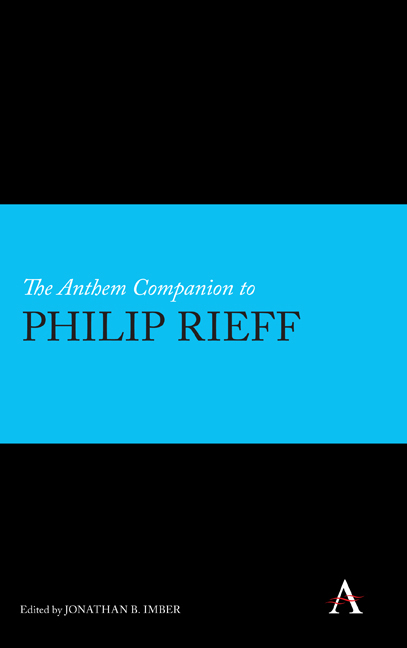Book contents
- Frontmatter
- Contents
- Introduction
- Chapter 1 Philip Rieff: Some Reflections
- Chapter 2 Philip Rieff and the Impossible Culture
- Chapter 3 Philip Rieff as Cultural Critic
- Chapter 4 Philip Rieff as Teacher
- Chapter 5 Prophet v. Stoic: Philip Rieff's Case against Freud
- Chapter 6 Decline and Fall in the Work of Philip Rieff: “I love the old questions” Beckett, Endgame
- Chapter 7 Philip Rieff as Social/ Cultural Theorist
- Chapter 8 Fellow Sons
- Chapter 9 Philip Rieff and Social Theory
- Chapter 10 A Kindly Apocalypse: Philip Rieff and the Endgame of the Therapeutic
- Chapter 11 Disenchantment, Authenticity and Ordinary Charisma
- Writings of Philip Rieff
- List of Contributors
- Index
Chapter 7 - Philip Rieff as Social/ Cultural Theorist
Published online by Cambridge University Press: 21 June 2018
- Frontmatter
- Contents
- Introduction
- Chapter 1 Philip Rieff: Some Reflections
- Chapter 2 Philip Rieff and the Impossible Culture
- Chapter 3 Philip Rieff as Cultural Critic
- Chapter 4 Philip Rieff as Teacher
- Chapter 5 Prophet v. Stoic: Philip Rieff's Case against Freud
- Chapter 6 Decline and Fall in the Work of Philip Rieff: “I love the old questions” Beckett, Endgame
- Chapter 7 Philip Rieff as Social/ Cultural Theorist
- Chapter 8 Fellow Sons
- Chapter 9 Philip Rieff and Social Theory
- Chapter 10 A Kindly Apocalypse: Philip Rieff and the Endgame of the Therapeutic
- Chapter 11 Disenchantment, Authenticity and Ordinary Charisma
- Writings of Philip Rieff
- List of Contributors
- Index
Summary
Fellow Teachers earned Philip Rieff the title “today's herald of the Great Dark” from one of his reviewers, and it is not difficult to see why. Near the end of the book, Rieff himself wrote, seemingly with a wry smile, “I am aware that these intimations of an alternative future appear entirely negative. It is not in my gift to be positive.” In this, he resembles his own description of Trotsky as the “legendary non- Jewish Jew, like Marx, essentially interested in what there is to defeat, not in what there is to win.” The overwhelming pessimism in Fellow Teachers is mitigated at some points, but then seemingly only in visions intertwined with sharp irony. While Fellow Teachers was a particularly biting work, many readers, with some justification, carry this judgment on Rieff's work as a whole. It would be a mistake, however, to let this overall tone wash out any substantive positive visions for human life in Rieff's corpus of work. In what are perhaps his most overlooked works, Fellow Teachers and Charisma, both written substantially in the mid- 1970s, Rieff does at times move beyond analysis and critique, and toward a substantive positive vision. In the two texts, Rieff provides glimpses into cultures that escape the triumph of the therapeutic. Thus they serve as a window onto a reconsideration of his contributions as a theorist of culture and society for those seeking the ramifications of his ideas beyond negative critique. As a social theorist, Rieff has been most effective and most studied for his insight into “the stakes” of modern ideologies. The logic of his own social and cultural criticism points beyond pure criticism, however; to stop there would leave the more hidden restorative potential of his theories untapped, and even further, misunderstood. This essay focuses on what Rieff attempted to build as a social theorist.
In Charisma, Rieff first turns to the past to find a positive vision. The Oxford American Dictionary and Thesaurus provides the most commonly used definition of the word: “an attractive aura; great charm.” The synonym given for charismatic is magnetic. Today the word connotes an ineffable quality that imbues certain individuals with the power to attract others. That this concept is a departure from earlier understandings of charisma lies at the heart of Rieff's book.
- Type
- Chapter
- Information
- The Anthem Companion to Philip Rieff , pp. 117 - 130Publisher: Anthem PressPrint publication year: 2018

